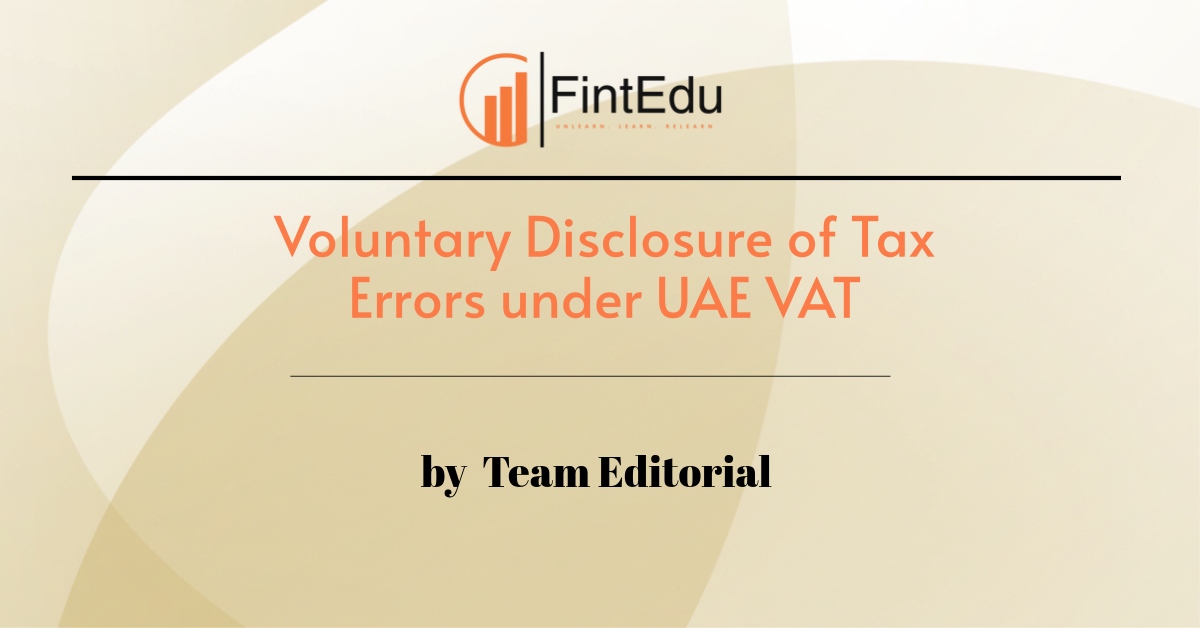LISTEN TO THE ARTICLE
Background
With effect from 1 March, 2023, all errors in VAT returns are to be disclosed voluntarily by assesses to the Federal Tax Authority (FTA), irrespective of the amount liable to be paid.
Earlier, there was a threshold limit of AED 10,000 implying that only errors crossing this limit were to be disclosed voluntarily. Now, the revenue has removed this threshold so as to ensure that all errors are mandatorily disclosed to the authorities.
What constitutes a Voluntary Disclosure (VD)?
A Voluntary disclosure is a form provided by FTA to enable a taxpayer to notify FTA about an error or omission made in a tax return, refund application or tax assessment. This form is helpful for taxpayers in order to disclose errors voluntarily.
When can a taxpayer exercise this option?
There are specific scenarios which are detailed by FTA where this option can be taken benefit of. Generally, assesses can execute this option in the below cases:
a) When a taxpayer identifies that a tax return or tax assessment submitted to the FTA has been filed with incorrect details, which has resulted into more or less tax payable in comparison to the actual amount, they can submit a VD to rectify such error
b) When a taxpayer identifies that a tax refund application submitted to the FTA has been filed with incorrect details, which has resulted into more or less tax refund in comparison to the actual amount, they can submit a VD to rectify such error
By when can this option be exercised?
A taxpayer can make a disclosure within 20 days from the date when he becomes aware of such error. Once the error is identified, it is recommended to file VD at the earliest feasible as per FTA guidance.
Are there any penalties levied?
FTA has proposed to levy a penalty of AED 1,000 for the first disclosure made by taxpayer and AED 2,000 for every disclosure made subsequently, implying that every subsequent disclosure will have a penalty levy of AED 2,000 for taxpayers.
These penalties shall be in addition to the penalties as per provisions of the law for late payment of taxes, as applicable.
How to submit a VD?
FTA has released a detailed guidance / user manual in order to enable taxpayers to submit VD. Briefly, VD can be submitted against filed return or filed refund or filed assessment by navigating to the Tab “VAT201 – VAT Returns” in the VAT section at the official website of FTA. It is required to submit all details pertaining to existing data and corrected data in ‘As reported’ and ‘As Current’ fields respectively.
Boon or bane?
Considering that UAE VAT laws provide an option to self-declare the errors, omissions or mistakes in the filed returns, assessments and refund applications, it is imperative for taxpayers to understand the exhaustive and overall view of this option and exercise caution while exercising this alternative.
It becomes crucial to understand that each and every single disclosure comes with a penal financial impact. Also, there are fixed penalties which are linked further to the amount of resultant tax obligations.
From a due diligence standpoint in industry, in order to safeguard the interests at a larger stake, it appears easy and accessible to file voluntary disclosure as and when any error is identified at any point in time during the course of financial year. Since most of the organization's focus on being compliant and diligent, it seems that VD is a great option to showcase genuine nature of transactions thereby leading to self-portrayal of a compliant organization.
However, as simple as it may seem, it does not practically hold the same uncomplexity. Considering that revenue has placed a ball in the court of taxpayers (with no threshold limit on tax amount) to declare errors by self-assessment mode, this opens plethora of factors to be taken into account.
One, when a taxpayer declares an error voluntarily, it not only catches Revenue’s eye, but it also comes in the radar of audit circle. Second, it becomes crucial to undertake a cost benefit analysis before declaring voluntary disclosures, to compare the amount of penalties and interest being levied vis-à-vis the amount of financial impact it may have owing to the error made. Third, since taxpayers are under constant scrutiny of tax authorities, it is important to be vigilant of the fact that what is the right time to disclose errors, it may be possible that the repercussions of disclosing one single error can open a larger chunk of financial statements coming into tax radar.
Therefore, it is pertinent to exercise caution in declaring self-assessed errors in returns or assessments or refund applications, to ensure that the larger objective of tax compliances is in alignment with the organization's financial state.
Disclaimer : The content on this website is provided for general informational purposes only. It is not intended as professional advice and should not be construed as such. The information is based on the knowledge and experience available at the time of writing and is subject to change.
Contributor
Related Posts

@@PLUGINFILE@@/Tax%20Group%20in%20UAE%20%E2%80%93%20Limitation%20on%20Interest%20Deducti...
Read More
@@PLUGINFILE@@/New%20Pension%20Law%20in%20the%20UAE%20and%20Emiratisation.mp3 LISTEN TO T...
Read More
@@PLUGINFILE@@/Saudi%20Arabia%20%E2%80%93%20Tax%20Measures%20to%20Boost%20Investments%20and%20...
Read More